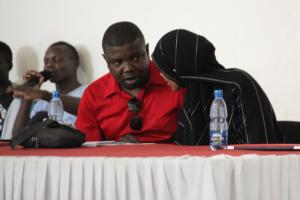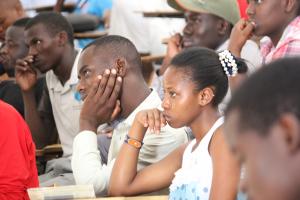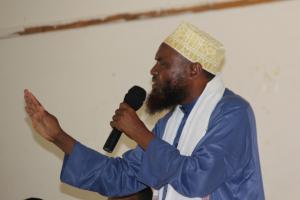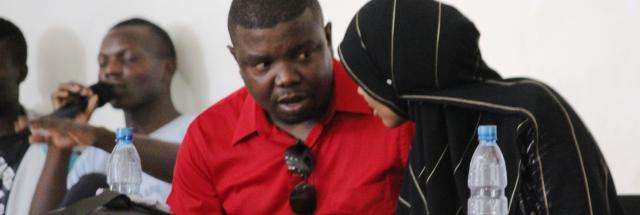Interfaith dialogue report, Garissa University, Kenya
Interfaith dialogue is about people of different faiths coming to a mutual understanding and respect that allows them to live and cooperate with each other in spite of their belief differences. Each party remains true to their own beliefs while respecting the right of the other to practice their faith freely thus promoting peaceful coexistence.
 Garissa lies in the northern part of Kenya. The town is 200km from the neighbouring war torn Somalia. It was initially considered among the top safest cities in Kenya but since 2013 things have changed. The town witnessed a series of attacks that claimed more than 200 lives, the latest being the Garissa University attack which claimed 148 innocent Kenyan lives. The Somalia based militia Al- Shabab claimed responsibility for the attack. Due to the wounds and tensions caused by this external force suspicion has been created in communities that once lived together without differences and hate. The incorrect perception that all Muslims are associated with the terror groups spread across the country causing more tension among the people from both faiths.
Garissa lies in the northern part of Kenya. The town is 200km from the neighbouring war torn Somalia. It was initially considered among the top safest cities in Kenya but since 2013 things have changed. The town witnessed a series of attacks that claimed more than 200 lives, the latest being the Garissa University attack which claimed 148 innocent Kenyan lives. The Somalia based militia Al- Shabab claimed responsibility for the attack. Due to the wounds and tensions caused by this external force suspicion has been created in communities that once lived together without differences and hate. The incorrect perception that all Muslims are associated with the terror groups spread across the country causing more tension among the people from both faiths.
Interfaith dialogue is therefore a commendable step towards bringing sustainable peace, coexistence and integration among the Muslim and Christian communities that reside in the region. Dialogue gives room for people from both faiths to share their view, challenge and recommend possible solutions so as to break the barrier and tension between the two communities. It is agreed among the two faiths that neither the Bible nor the Quran allows for the loss of any innocent life. This common and/or mutual statement therefore strengthens the relationship between Muslims and Christians.
Interfaith Dialogue in Garissa - Garissa University
Initiatives of Change (IofC) started its first interfaith dialogue in Garissa in 2016, less than one year after the horrendous terror attack at the Garissa University. The plan is to expand the interfaith dialogue to other towns in the country due to success stories witnessed in addressing fear, tension and perception between the Muslim and Christian community living in this area of the country. The dialogues were initially held in hotel conference rooms which limited access and participation. The Dean of students at the Garissa university requested for the dialogue to be taken inside the university to further address and reach students from different faiths in the university. In 2018, IofC partnered with the university to reach as many students as possible.
 The first interfaith dialogue held inside the Garissa university attracted more than 80 students, members of civil society, clergy from both Muslim and Christian faiths, as well as other members of the community. The students appreciated the dialogue and requested for more dialogues to be held at to the university especially during admission of new students at the commencement of new academic year. IofC will conduct follow up dialogues at the university to reach more people and address this issues to promote sustainable peace and coexistence.
The first interfaith dialogue held inside the Garissa university attracted more than 80 students, members of civil society, clergy from both Muslim and Christian faiths, as well as other members of the community. The students appreciated the dialogue and requested for more dialogues to be held at to the university especially during admission of new students at the commencement of new academic year. IofC will conduct follow up dialogues at the university to reach more people and address this issues to promote sustainable peace and coexistence.
CAUSES OF TENSION
- Lack of information regarding people from different religions/beliefs
- Incorrect perception that all Muslims are linked to terror groups
- The media focus on terrorism and Islam as well as security agencies and human rights violations causes tension, suspicion and fear between the two faiths
- External forces like the militia group Al-Shabab
- The whole idea of Islam, terrorism and Jihad is not clear
- Fear of the repeat of the previous attack at the university
- Pointing fingers instead of finding a solution to the problem
- Disconnection between the security agency and the community
- Neglect of teaching moral values in schools
- Religious difference used as a tool but religion is not the cause
WAY FORWARD
- Leaders from both faiths to hold meetings regularly bringing people from both faiths together to build trust and understanding
- Seek information and clarification before judging the beliefs of others
- Mutual understanding and respect for each other’s religion and beliefs.
- University students to sphere-head dialogue to promote unity and coexistence
- Leaders from both faiths take the initiative of having interfaith dialogues at schools, churches, mosques, religious institutions, and community gatherings so as to strengthen relationship
- There is a need for county/national interfaith dialogue
- Youth should take the initiative of preaching peace and harmony between the two faiths
- Media coverage should be positive and avoid causing tension by focusing on negative aspects
- Be champions and take the lead in re-branding the university in academics, discipline, peace and coexistence
- Avoid bringing in strangers into the university
- Work closely with the university administration by alerting them of anything suspicious or threatening
- Follow the security measures put in place and work closely with the university security personnel and the county commissioner’s office
- Take a role in spreading peaceful messages and work together as brothers and sisters appreciating each other’s difference in faith, cultural background and embracing unity in diversity
- University students to be brother’s keepers regardless of their difference in faith
- Both faith should stand with each other during difficulties and never give room for any division that may create enmity and fear associated with religious difference
 The people’s perception and reality are two different things and it is only dialogue that brings out understanding as well as clearing the incorrect perceptions of the Christian and Muslim faiths. There was energetic and interactive dialogue that clearly outlined the role of not only the Muslims and Christians but also the security as part of the community and stakeholders. There was mutual agreement that neither of the religions allows killing of innocent lives. Harmony and coexistence is taught by both the Bible and the Quran. The participants promised and committed themselves to take part in promoting sustainable peace and coexistence and also recommended that there is need for strict teaching of moral values in religious institutions as well as preparatory schools and also efforts made to attain justice and respect of human rights and the Kenyan law.
The people’s perception and reality are two different things and it is only dialogue that brings out understanding as well as clearing the incorrect perceptions of the Christian and Muslim faiths. There was energetic and interactive dialogue that clearly outlined the role of not only the Muslims and Christians but also the security as part of the community and stakeholders. There was mutual agreement that neither of the religions allows killing of innocent lives. Harmony and coexistence is taught by both the Bible and the Quran. The participants promised and committed themselves to take part in promoting sustainable peace and coexistence and also recommended that there is need for strict teaching of moral values in religious institutions as well as preparatory schools and also efforts made to attain justice and respect of human rights and the Kenyan law.


